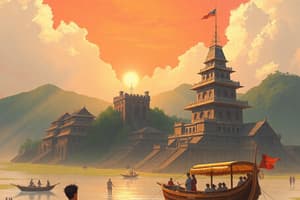Podcast
Questions and Answers
What does the Greek word 'historia' mean?
What does the Greek word 'historia' mean?
learning by inquiry
According to Numa Denis Fustel de Coulanges, what is history?
According to Numa Denis Fustel de Coulanges, what is history?
- Study of natural phenomena
- Acc accumulation of events
- Product of scientific investigation (correct)
- Science of human societies (correct)
History is solely concerned with factual events.
History is solely concerned with factual events.
False (B)
Who wrote the Filipinos’ version of the Cavite Mutiny of 1872?
Who wrote the Filipinos’ version of the Cavite Mutiny of 1872?
What limitations does historical knowledge face?
What limitations does historical knowledge face?
History deals with the study of past _______.
History deals with the study of past _______.
What is historiography?
What is historiography?
What is a key aim of historians when reconstructing history?
What is a key aim of historians when reconstructing history?
Match the historical figures with their contributions:
Match the historical figures with their contributions:
Historical method involves imaginative reconstruction of the past.
Historical method involves imaginative reconstruction of the past.
Flashcards
History's Meaning
History's Meaning
History is the systematic study of past events, focusing on human societies and their actions.
Factual History
Factual History
History focusing on the who, what, when, and where of events.
Speculative History
Speculative History
History exploring motivations and reasons behind events.
Historical Reconstruction
Historical Reconstruction
Signup and view all the flashcards
Historiography
Historiography
Signup and view all the flashcards
Historical Methods
Historical Methods
Signup and view all the flashcards
Limitations of Historical Knowledge
Limitations of Historical Knowledge
Signup and view all the flashcards
Verisimilitude
Verisimilitude
Signup and view all the flashcards
Historical Analysis
Historical Analysis
Signup and view all the flashcards
Historical Research
Historical Research
Signup and view all the flashcards
Study Notes
Meaning of History
- History derives from the Greek word "historia," meaning learning by inquiry.
- Aristotle defined history as a systematic accounting of natural phenomena arranged chronologically.
- History is the scientific investigation of past events, reflecting human societies.
Concepts of History
- History is not just a collection of past events; it's a structured science focused on human societies.
- Numa Denis Fustel de Coulanges emphasizes that history should be treated as a science.
- Zeus A. Salazar states that "Kasaysayan" reflects meaningful narratives that resonate with every Filipino.
Types of History
- Factual History: Focuses on specific details—including when, where, and who of events.
- Speculative History: Explores reasons and motivations behind events, seeking to understand why and how they occurred.
Key Historical Events
- Dr. Trinidad H. Pardo de Tavera published a Filipino perspective on the 1872 Cavite Mutiny.
- On June 1, 1649, Agustin Sumuroy led an uprising against Spanish authorities due to forced labor.
- Museums play a crucial role in preserving human history and individual experiences.
- The Philippines gained independence from Spain on June 12, 1898, following a protracted conflict with American forces.
Role of Historians
- Historians aim to understand the present by examining past events.
- They undertake rigorous research to reconstruct meaningful narratives of history.
- Historiography involves gathering documents from libraries and archives to create a pool of historical evidence.
Limitations of Historical Knowledge
- Historical knowledge is often limited due to incomplete records; many events lack documentation or artifacts.
- The available surviving records represent only a fraction of the overall historical phenomena.
Reconstruction of History
- The project of history is to meaningfully reconstruct the past based on available evidence and inferences.
- The aim is to achieve verisimilitude—truth, authenticity, and plausibility—of historical accounts.
- History is seen as an art that involves sifting through various narratives to find those that closely resemble the truth, per Francis Bacon.
Historical Methods
- Key skills in historical research include selecting subjects for investigation, collecting relevant information, examining sources critically, and extracting credible details.
- The process of historical analysis involves imaginative reconstruction based on gathered data and critical examination.
Studying That Suits You
Use AI to generate personalized quizzes and flashcards to suit your learning preferences.




